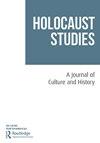Breaking silences in the Aftermath of Holocaust trauma in Elie Wiesel’s Day
IF 1
Q1 Arts and Humanities
引用次数: 0
Abstract
ABSTRACT This article employs a close reading of Elie Wiesel’s third novel, Day (1961), as a lens through which to explore the difficulties inherent in disengaging from the Holocaust past and their impact on the Holocaust survivor’s efforts to live in the present. In particular, The article explores how the novel’s narrative employs silence, a key Wieselian symbol, in constructing its overarching framework. These textual silences, I suggest, portray the text’s protagonist’s inability to escape his past at the camps. It is only through transforming these silences into speech that he is able to truly begin to live in the present.在Elie Wiesel的日子里打破大屠杀创伤余波中的沉默
摘要本文通过细读Elie Wiesel的第三部小说《Day》(1961),来探讨脱离大屠杀过去所固有的困难,以及这些困难对大屠杀幸存者努力生活在当下的影响。特别是,这篇文章探讨了小说的叙事如何利用沉默这一维塞尔式的关键象征来构建其总体框架。我认为,这些文本的沉默描绘了文本主人公无法逃离他在营地的过去。只有通过将这些沉默转化为言语,他才能真正开始生活在当下。
本文章由计算机程序翻译,如有差异,请以英文原文为准。
求助全文
约1分钟内获得全文
求助全文

 求助内容:
求助内容: 应助结果提醒方式:
应助结果提醒方式:


